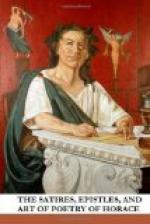His lessons form the child’s young lips, and wean
The boyish ear from words and tales unclean;
As years roll on, he moulds the ripening mind,
And makes it just and generous, sweet and kind;
He tells of worthy precedents, displays
The example of the past to after days,
Consoles affliction, and disease allays.
Had Rome no poets, who would teach the train
Of maids and spotless youths their ritual strain?
Schooled by the bard, they lift their voice to heaven,
And feel the wished-for aid already given,
Prom brazen skies call down abundant showers,
Are heard when sickness threats or danger lowers,
Win for a war-worn land the smiles of peace,
And crown the year with plentiful increase.
Song checks the hand of Jove in act to smite;
Song soothes the dwellers in abysmal night.
Our rustic forefathers in days of yore,
Robust though frugal, and content though poor,
When, after harvest done, they sought repair
From toils which hope of respite made them bear,
Were wont their hard-earned leisure to enjoy
With those who shared their labour, wife and boy;
With porker’s blood the Earth they would appease,
With milk Silvanus, guardian of their trees,
With flowers and wine the Genius, who repeats
That life is short, and so should have its sweets.
’Twas hence Fescennia’s privilege began,
Where wit had licence, and man bantered man;
And the wild sport, though countrified and rough,
Passed off each year acceptably enough;
Till jokes grew virulent, and rabid spite
Ran loose through houses, free to bark and bite.
The wounded shrieked; the unwounded came to feel
That things looked serious for the general weal:
So laws were passed with penalties and pains
To guard the lieges from abusive strains,
And poets sang thenceforth in sweeter tones,
Compelled to please by terror for their bones.
Greece, conquered Greece, her conqueror subdued,
And Rome grew polished, who till then was rude;
The rough Saturnian measure had its day,
And gentler arts made savagery give way:
Yet traces of the uncouth past lived on
For many a year, nor are they wholly gone,
For ’twas not till the Punic wars were o’er
That Rome found time Greek authors to explore,
And try, by digging in that virgin field,
What Sophocles and Aeschylus could yield.
Nay, she essayed a venture of her own,
And liked to think she’d caught the tragic tone;
And so she has:—the afflatus comes on hot;
But out, alas! she deems it shame to blot.
’Tis thought that comedy, because its source
Is common life, must be a thing of course,
Whereas there’s nought so difficult, because
There’s nowhere less allowance made for flaws.
See Plautus now: what ill-sustained affairs
Are his close fathers and his love-sick heirs!
How farcical his parasites! how loose
And down at heel he wears his comic shoes!
For, so he fills his pockets, nought he heeds
Whether the play’s a failure or succeeds.




